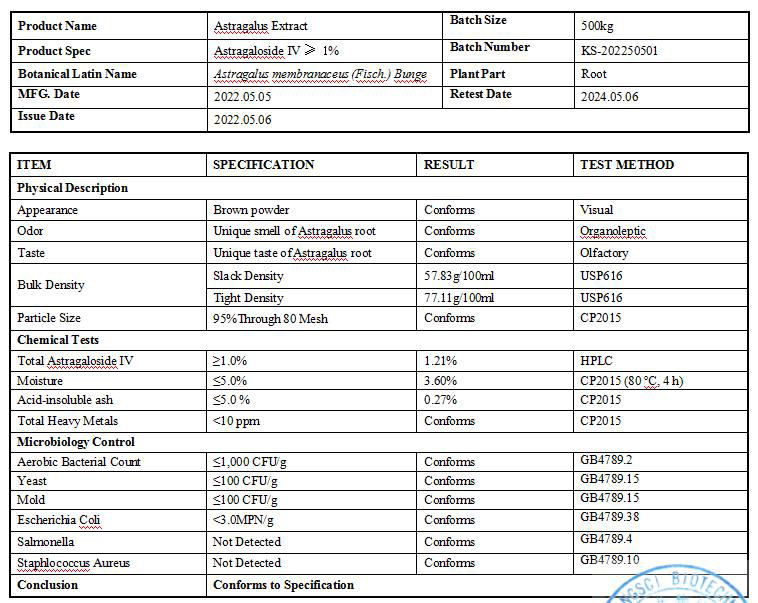
Latin Name: Astragalus membranaceus (Fisch.) Bunge
Specification: Astragaloside 0.3%-98%; Polysaccharides10-70%
Appearance: Brown yellow powder
Test Method: HPLC, UV
Certificate: HACCP, ISO, FDA, KOSHER
KS Nutripharma raw material of Astragalus extract comes from Liupanshan in Ningxia. It is extracted and concentrated by a special process, and the powder is processed by spray drying technology. The powder has good water solubility, can be dissolved instantly at room temperature, has stable properties, and is easily absorbed by the human body. It can be used as raw materials for pharmaceutical nutrition, veterinary drug feed, etc.

Astragalus polysaccharides have been utilized as immune enhancers or regulators, with anti-virus, anti-tumor, anti-oxidation, anti-radiation, and anti-stress properties. They can also be used to boost body resistance, promote immunity, and promote the manufacturing of antibodies. Astragalus polysaccharides powder is employed as immune boosters and antiviral medication in pig production in the application field. This effectively increases the disease resistance and productivity of pigs, consequently encouraging non-specific and specific immunity, and enhancing the immune system. The advantages of safety, lack of hazardous side effects, and abundance of resources outweigh disease resistance and resistance.
There are three different types of astragaloside: astragaloside I, astragaloside II, and astragaloside IV. The most biologically active of them is astragaloside IV, which has an antiviral impact that is 30 times stronger than that of astragalus polysaccharides and efficacy that is more than 2 times that of typical astragalus polysaccharides. It is also known as “super astragalus polysaccharide” due to its low content and beneficial benefits. This compound has a variety of pharmacological activities, including regulating immunity, defending tissues and organs, decreasing blood sugar, fighting apoptosis, and being anti-inflammatory and antiviral. Additionally, astragaloside IV should not be used by pregnant women due to its potential for reproductive harm.
In clinical use, the most common side effect of Astragalus is allergic reactions, mainly including skin allergies, asthma, high fever, anaphylactic shock, etc. Allergic reactions caused by Astragalus may be related to the proteins, polysaccharides and other components it contains. These macromolecular substances belong to the Complete antigen, the body is stimulated by these components will trigger an antigen-antibody reaction, once an allergic reaction occurs, the drug should be discontinued and medical treatment should be taken immediately.

